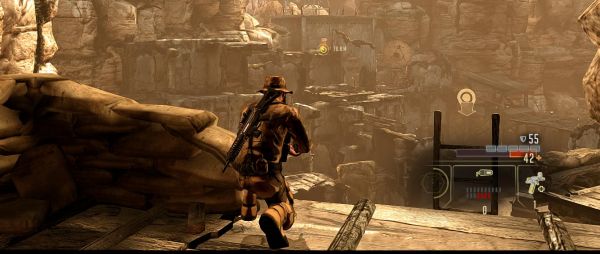Wot I Think: Alpha Protocol
If you haven’t read my experiences with the first couple of hours of Alpha Protocol, it’s worth reading those first, since I’ll be building on top of that. That done, here's Wot I Think:
Things weren’t good. An extremely buggy game, with an inauspicious start. Having finished it, almost twice in fact, has my opinion changed? Yes, certainly. Has it been redeemed as the excellent espionage RPG we were all hoping for? No, absolutely not. Alpha Protocol is a game with enormous spirit, and little delivery. It’s huge in scope, certainly does offer you the ability to progress through it in distinct ways, and contains a ton of interesting relationships and witty characters. But since you spend the majority of the game running around either shooting or stunning enemies, the poverty of its action isn’t something that can exactly be ignored.
Your character, Michael Thorton, travels around the world, from China to Russia to Italy, to uncover a conspiratorial plot of big business, secret organisations, and a plan to create a new cold war. In each country he gets a safehouse, access to a weapons store, and communications with a collection of equally rogue characters met in his travels. While he always works alone, Thorton is accompanied by a handler for each mission, who chats in his ear and offers advice. Before missions you can gather intel, speak to associated characters, and equip yourself specifically for the task, then choosing how exactly you want to approach the goals. Or indeed what the goals might be.
The promise of being able to get through the game without killing anyone is, well, technically true. However, you’re simply substituting killing for knocking unconscious. You still fire a gun or apply a karate chop, and the body still falls to the floor, fading from existence seconds later. As a mechanic, the game is near-identical if you play it as a murderous lunatic or an anaesthetist gone rogue. And as a third-person action game, it’s simply sub-par. The game it reminds me of most, actually, is Stranglehold, which perhaps isn’t the direction a sneaky spy-based game should have headed in.
However, that choice does have a significant effect on much else in the game. For instance, your relationship with colleagues, and in turn the perks and bonuses you receive.
In fact, the perks and bonuses system is absolutely fantastic. Pretty much everything you do, from how you kill to the way you reply to emails will accumulate and give you various boosts. For instance, one mission sets you up with a sniper rifle and a series of people to identify. Once your target is spotted you can choose to take him out, or let him live, based on the evidence you have. But should you choose to, you can mindlessly murder everyone else at the end of your scope, so long as you don’t let any witnesses escape. Replaying the game as a complete bastard I received “Trigger Happy”, an achievement that reads:
“While gunning for Al-Bara, you “accidentally” killed some other people at the party… these things happen.
Reduced Cooldown: Room Sweep.”
You can obviously level up to focus on various specialities: technical skills, specific weapons, stealth, and the like. Different classes have access to all specialities, but the later levels of expertise are only available to specific classes. Then each of these is tweaked by those many, many perks that appear, relevant to how you’ve chosen to play. It’s a great system.
Conversations are another highlight, and a significant one, since there are hundreds. How you choose to conduct yourself, picking a mood in which you want to reply while the other character is speaking, defines how you get on with people. This can have minor impacts, such as changing a perk you might receive depending upon their feelings about you. Or major impacts such as determining who will be willing to help you out, send in reinforcements, or provide you with necessary details.
The most prominent of these is with Mina, your handler for the majority of the game. She’d far rather you chose to keep as many people alive as you can, and is completely intolerant of the deaths of civilians. (However, there are others who find such things a thrill.) However, unlike many games where letting her down would lead to losing out on a bonus, here it instead changes the nature. Extremes are advantageous, so either win her heart or drive her to loathe you, and you’ll gain advantages either way.
There are other significant characters along the way, with your ability to make enormous choices like whether they live or die, or many smaller ones regarding how you might let them help you out. Do you send information you find on Halbec, the evil corporation selling weapons to two sides of a potential war, to a reporter who can expose it in public (and pay you $1000 in return), or do you use it to blackmail the company (and get $15,000 in your account)? Or perhaps you sell that information on the black market to the highest bidder.
There is one giant flaw here, however. Much of the main dialogue is independent of how characters feel about you. Insult them, and they'll react. But be a complete dick, having everyone hate you, and more often than not the chatter turns ludicrously amiable, even having Thorton reply in flirty or upbeat ways. Play nice and it all seems seamless. Play nasty, and enormous cracks start to show.
So choice – the big feature on which the game is sold – certainly does have an effect. And one is more startling than any previously mentioned. The order in which you travel the world.
Heading to Rome before Moscow is an arbitrary decision when you make it. But the consequences are fascinating. While it doesn’t ultimately transform the narrative, it certainly effects how you experience it. During my first play through I was as saintly as I could be (apart from accidentally stabbing one Chinese policeman in the neck, which was sad). But on a second play I went as awful as I possibly could, senselessly murdering citizens at every opportunity. Tales of my antics were spoken of later, not only by characters I met and the man interviewing me in the punctuating flashbacks that drive the narrative, but also by NPCs chatting around corners.
Then it goes deeper still, with the game forcing you to make some stark choices. Do you save the girl or stop the bombs? Each has consequences felt in later cities. However, do that mission in your final destination and no such repercussions will be revealed. Of course you’re still ploughing through the same overarching story, but a great deal of how you get there feels personal to you.
So that’s the best of the news. The worst is what a mess the core game can be.
Enemy AI, for example, is often shocking. They vary, as if in an attempt to embrace the worst of the genre, from psychic precision to a vegetative state. Creeping in the far back corner of a vast multi-levelled room affords no protection from an idling guard 50 metres and two storeys away from you. If there’s line of sight, they see you. Or perhaps they stand there facing you while you murder their chums, and then politely wait for you to finish filing their faces with bullets before having a lie down. The former is infuriating in a game that should be offering a way to stealth through a level. Invariably you end up in some sort of firefight, even if you choose to shoot blanks. The latter is laughable, and makes the game seem cheap.
Then it can often go completely to shit, with helicopters becoming invincible, men magicking out of nowhere, and missions refusing to end despite all criteria being met. (Each happened to me once during one play through.) More often there’s icky clipping, nasty staggers and loading as the game struggles to fill in the level, and at one point a sniper rifle that causes Mike to float and spin on the spot before he can use it. Which was kind of cool.
Getting through any area is always interrupted by dozens and dozens of tedious minigames. There are three main types, and each is utterly awful and a miserable waste of time. It’s incredible how dominant these become, every other room containing a lock to pick, a computer to hack, and thanks to psychic guards, inevitably an alarm to turn off. If they at least varied, then perhaps there’d be some reason to keep being interrupted. But instead it’s like driving down a road covered in ludicrous speedbumps, endlessly having to slow to a halt just to progress.
I should say some things in defence of the combat, which – if specialised correctly – can offer some highlights.
While it’s little more than a shooting gallery, the hand-to-hand martial arts are fun to use, and if you get the assault rifle souped up suitably it can be a big pleasure using it to pick out headshots from a room of enemies. (Of course, this is only an option if you’ve abandoned any plans of being subtle.) Focusing on one weapon seems to be the trick. I used the pistol and fisticuffs to get through most of the game the first time through, and while it limits your options it’s certainly possible.
The level of customisation is quite remarkable, each of the huge number of guns and pieces of armour able to be tweaked to your satisfaction. Then all the stats previously mentioned, combined with the relationships you choose, and the people you ally with, means that huge amounts have been achieved.
The beginning is just awful, but the three main cities offer a great deal of entertainment. Of course they’re frustrated by the issues above, and it’s inescapable that the core action-shooter mechanics are mostly mediocre. But I still immediately started it again once it was finished. That’s got to count for something.
And after a write-up this muddled and bi-polar, I realise it doesn’t perhaps indicate too helpfully whether you should buy it. I say do. But go in knowing how flawed it is. With the additional proviso that the bugs mentioned in my previous article are extremely serious. I played the game using a 360 controller, and I’m pretty convinced it would have been impossible without one, certainly pre-patch.
It’s not a game about being a spy. It’s a game about being an international mercenary, who single-handedly cleans out cities of their baddies, while sometimes placing a bug. It’s not a brilliant game, but it’s one packed with imagination and inspired ideas.

























